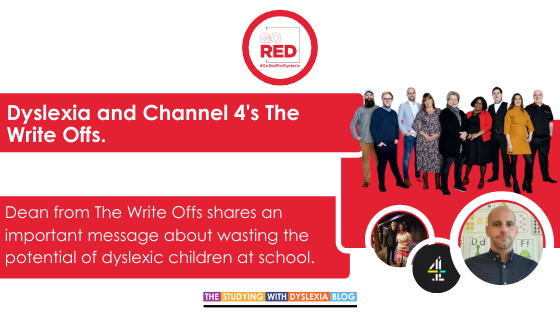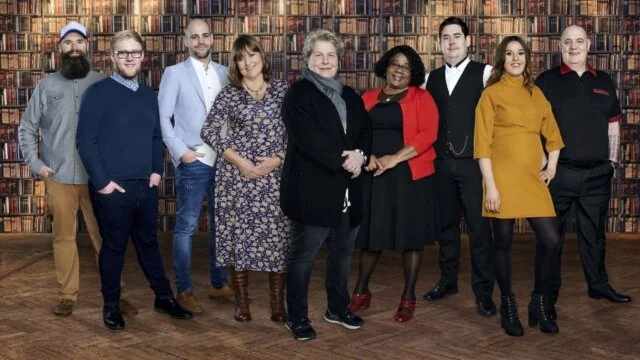Recently Channel 4 aired The Write Offs, a two part documentary that got the country talking about literacy and dyslexia. One of the participants, Dean Roebuck has kindly shared his final speech from the show on The Studying With Dyslexia Blog and it is an important message about the potential of young dyslexic minds.
When I recently watched The Write Offs on Channel 4 I resonated really strongly with the emotion in the stories portrayed about the eight participants. At the end of the two part documentary highlighting their challenges around dyslexia, asphasia and literacy, the participants delivered a pantomime at Shakespeare’s Globe Theatre in London as well as give a speech to their audience of loved ones and supporters. Whilst most of the participants spoke about their journey and what they had achieved, one participant’s speech gave a broader message. What he shared in just a few words hit me. His words were about why our education system does not adequately meet the needs of children with dyslexia thus wasting potential and negatively impacting society.
Then to my surprise, somehow on social media, via a comment his partner made on one of my posts, we ended up making contact, having a call and it resulted in Dean kindly sharing his whole speech to be published for the first time on The Studying With Dyslexia Blog.
So I am proud to be able to help him to share his message . It is an important message that parents, teachers and headteachers need to hear.
Please read on and share this post so that Dean’s message gets the airtime it deserves during Dyslexia Awareness Week 2020.
Dean writes:
Benjamin Franklin, who was dyslexic himself, said, “Tell me and I will forget. Teach me and I may remember. Involve me and I will learn.
This quote makes sense to me when I look back at my time in school: in the English room, waiting for my work to be checked. We would have written about some book that I wasn’t interested in. My English workbook would be littered with red marks, spelling mistakes put right, missed grammar put in, but with no explanation as to why it was wrong. Was I missing something that everyone else was getting effortlessly?
The participants of Channel 4’s The Write Offs: Photo Channel 4.
Standing up in class and reading out loud filled me with anger and embarrassment. And it would end one of two ways: Sitting down all red faced after what seemed like an hour of reading, or being told to go to the principal’s office for acting up after hearing giggles, as I was stuck on a word that was simple to the others. This went on all the way through my English schooling, and I can never remember the teacher telling the other kids not to laugh, or telling them that it wasn’t my fault and I was dyslexic. I think this shaped the way I am today, thick skinned but, in day to day life, I shy away for anything to do with reading and writing. Even reading a book to my kids would put me back behind the eyes of that angry, confused kid.
My time with the amazing Rosemary (my tutor on Channel Four’s Write Offs) has shown me that I can learn English, and at a fast pace, as long as it is put in a format that I can get involved in. Where was she for my 7 years of English classes as a child?
But for the first time in a long time I feel more engaged and alive with our beautiful language and, with every book I read with my children, I feel less of that angry, confused kid. I am for the first time in my life enjoying learning English, and I am looking forward to continuing my learning after my time on The Write Offs.
Dean (the ugly sister in the pantomime) with actor and musician, Martin Kemp who shared his experience of literacy challenges after suffering a couple of brain tumours.
Having reading and writing difficulties isn’t just my story. With 1 in 10 of us having dyslexia, and 1 in 5 of us being classed as functionally illiterate, there are a lot of us out there. But when I set out on this journey I knew nothing of what being dyslexic really meant, only that I had it. I’d never been told of the great accomplishments of Albert Einstein, Sir Isaac Newton, Thomas Edison and Alexander Graham Bell who had a dyslexic brain just like me. Or that 50% of all NASA scientists are dyslexic too. And that’s just a really short list. Maybe I could have been a scientist if my head was full of these wonderful facts as a kid.
Did you know that there are a staggering number of young offenders with reading and writing difficulties? I can see how the anger and disconnection I felt towards my peers and teachers in school could have shaped my life decisions and sent me down the wrong path if it weren’t for good friends and family. On the other hand did you know that 40% of the world’s self-made millionaires are dyslexic? That is a big difference in outcomes.
Now imagine if those young offenders were given a teacher like we have had. Someone to tell them that their big beautiful brain just thinks differently to everyone else’s, and needs teaching in a different more involved way.
Someone to fill their heads with all the great people that have gone on to do wonderful things with their lives because of their brains and how they think differently.
My question to you is: Do you think we could stop wasting great minds? Do you think we could unlock the next Einstein?
Please click…
Sign the petition.
Want to support the work of John Hicks and The Studying With Dyslexia Blog and gain exclusive access to content that informs and inspires the supporters of dyslexic learners?
Join our community of patrons who support the Studying With Dyslexia Blog on a monthly basis in return for specific perks that further helps to inform and inspire, you, the supporter of a dyslexic learner.
Click the button below to become a patron.







